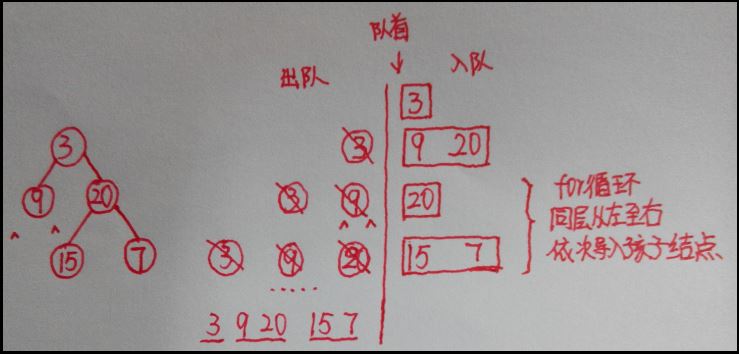目录:
1.Binary Tree Level Order Traversal - 二叉树层次遍历 BFS
2.Binary Tree Level Order Traversal II - 二叉树层次遍历从低往高输出 BFS
3.Maximum Depth of Binary Tree - 求二叉树的深度 DFS
4.Balanced Binary Tree - 判断平衡二叉树 DFS
5.Path Sum - 二叉树路径求和判断DFS
题目概述:
Given a binary tree, return the level order traversal of its nodes' values. (ie, from left to right, level by level).
For example:
Given binary tree {3,9,20,#,#,15,7},
3
/ \
9 20
/ \
15 7
return its level order traversal as:
[
[3],
[9,20],
[15,7]
]Here's an example:
1
/ \
2 3
/
4
\
5
The above binary tree is serialized as "{1,2,3,#,#,4,#,#,5}".
题目分析:
本题考查的就是二叉树的层次遍历,需要注意的是二叉树用数组的表示方法,二叉树的每层是从左到右存入数组的。方法包括:
1.层次遍历。二维数组存储数字和深度,输出二维数组即可,过于复杂。
2.通过队列BFS广度优先搜索。
3.通过DFS深度优先搜索实现。
我的代码:
代码详解:
该题目你如果采用C语言二维数组过于复杂,故采用C++的容器vector实现。同时BFS广度优先搜索采用队列queue实现,常见方法如下(参考地址):
1.栈操作
2.队列操作
3.二叉树层次遍历如何使用队列
由于二叉树是从左至右进行输入,故层次遍历通过队列存储每层的结点,它存储的顺序也是前一个结点的左孩子结点、右孩子结点,依次顺序进出队列。
DFS代码参考地址:LeetCode Binary Tree Level Order Traversal
其他题目:
Binary Tree Level Order Traversal II
层次遍历从低往root结点输出,如 Given binary tree {3,9,20,#,#,15,7},
3
/ \
9 20
/ \
15 7return its level order traversal as:
[
[15,7],
[9,20],
[3]
]PS:如果是每层的也要逆序的话,就把left 和right 入队的顺序调换一下。另一种遍历方法参考:http://www.cnblogs.com/ganganloveu/p/3843470.html
常见方法通过BFS层次遍历计算二叉树层数及深度或通过DFS计算二叉树从root到leaf结点最长路径及深度,在采用BSF代码中可通过前面代码进行修改,但错误:
[0,2,4,1,null,3,-1,5,1,null,6,null,8] output=5 Excepted=4
故采用DFS进行深度递归搜索。代码如下:
BFS代码参考:http://blog.csdn.net/sunbaigui/article/details/8980887
Balanced Binary Tree - 判断平衡二叉树
平衡二叉树是一 棵空树或它的左右两个子树的高度差的绝对值不超过1,并且左右两个子树都是一棵平衡二叉树。参考前面的计算深度方法完成。
另一种方法参考地址,也可通过后序遍历实现。
Given a binary tree and a sum, determine if the tree has a root-to-leaf path such that adding up all the values along the path equals the given sum.For example:
Given the below binary tree and sum = 22,
5
/ \
4 8
/ / \
11 13 4
/ \ \
7 2 1
return true, as there exist a root-to-leaf path 5->4->11->2 which sum is 22.
该题主要考察DFS或BFS计算root到leaf结点路径求和是否存在一条与sum相等的path。我采用DFS结合计算二叉树深度完成,最初打算自定义isNode(*root,num)函数判断,后来直接通过判断每个结点是否是leaf且值为sum-前面结点。代码如下:
